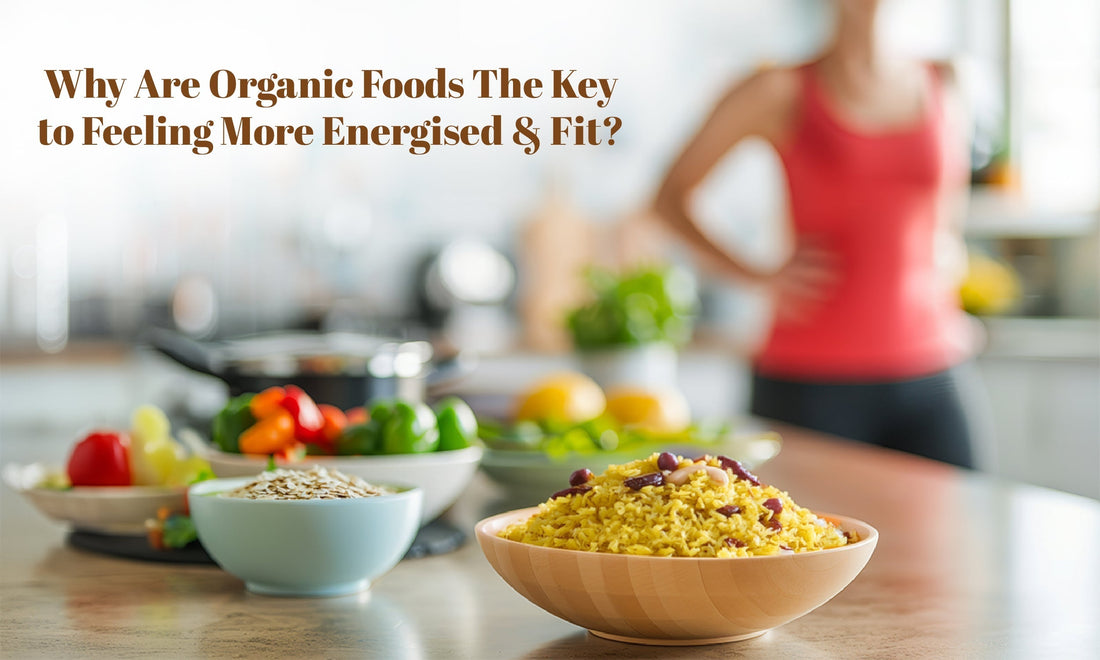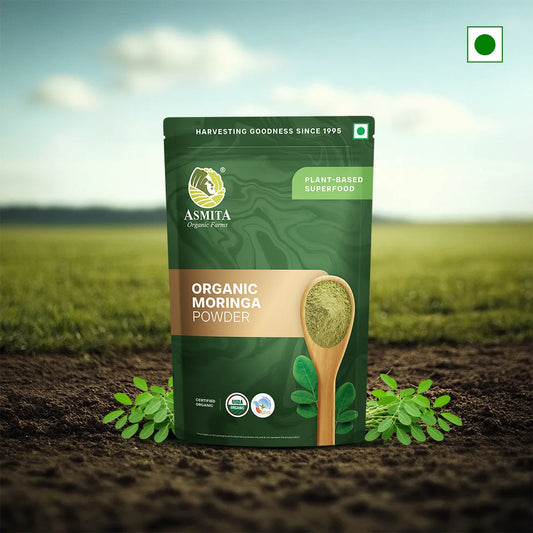Health Benefits of Eating Organic Food
Info Organic 5 min read
It’s that time of the day when you are strolling through your local market finding healthy food items. You have almost picked up that healthy sugar, until you see another option, labelled ‘organic’.
A thought might flash through your mind – what is meant by organic foods? What are the benefits of organic food? Should you be eating these organic foods?
Once only available in special stores, organic food is now easily available at most offline and online stores. Now that’s where the problem starts!
For instance, you have two sugar options that you need to choose from. One is grown with conventional methods using pesticides. The other one is organic. Both sugars have a shiny appearance and are rich in flavour and nutrition. Which one would you pick? That’s when you get your facts checked before you shop!
Explore the blog to find out what is organic food, benefits of eating organic food, things to consider while purchasing organic food, how to find out the certified organic food products, and demand of organic food over non-organic food.
With that said, it will be a cherry on the cake if you pick the best organic food for exceptional taste and flavour from peoples-favourite organic brand in India!
Table of Contents
1. What is Organic Food?
2. Benefits of Eating Organic Food Products
3. Things to Consider While Purchasing Organic Food
4. How to Find out the Certified Organic Food Products
5. Demand of Organic Food Over Non-Organic Food
6. Bottom Line
7. Frequently Asked Questions
What is Organic Food?
Before 1950s, what we now term ‘organic’ was simply ‘normal’. It was during the Second World War when animals and plants grown with medications, fertilisers and pesticides, and even a bit of genetic engineering have become common. This means, our farming practices and diets have changed dramatically in just over 70 years.
Now let’s learn about what is organic food! According to Jaivik Bharat, organic food meaning is simple:
“Any raw material (such as spices, oils, grains, etc.) or food form grown close to nature without using any artificial/synthetic products, like antibiotics, pesticides, fertilizers, hormones, etc. Organic food also forbids the use of genetically modified organisms (GMOs).”
Point to ponder – does ‘organic’ mean the same as ‘natural’?
Not really! Both the terms organic and natural are different. If the food is labelled ‘natural’ that means it has been grown with no artificial colours, preservatives, or flavours. ‘Natural’ has nothing to do with the type of method or material used to grow it.
On the other hand, organic food products are grown in compliance with organic farming standards. This regulates the way these organic products are grown and manufactured.
For instance, organic livestock raised for dairy products, such as ghee must be raised in certain habitat that accommodates their natural living environment and fed organic food. The cattle should not be given any animal by-products, growth hormones or antibiotics.
In 2023, India produced around 2.9 million metric tons of certified organic products, covering various food categories such as oilseeds, fiber, cereals, and millets.
Thus, organic food are products of holistic agricultural practices focusing on bio-diversity, soil-health, pesticides-free inputs, etc. with an environmentally and socially responsible approach that have been produced in accordance with organic production standards.
Benefits of Eating Organic Food Products
Here are the top benefits of organic food that you should consider:

Organic food is packed with nutrient-rich goodness
Containing higher levels of antioxidants, particularly polyphenols, organic foods have been found to reduce oxidative stress in the body.
Additionally, some studies suggest that these nutrient boosts in organic foods, such as increased levels of carotenoids (α-carotene, β-carotene, lutein, and zeaxanthin), can positively influence plasma levels of these essential nutrients.
At AsmitA Organic Farms, our healthy organic food, such as Organic Moringa Powder, Organic Urad Dal, etc. are naturally richer in iron and magnesium. Moreover, eating our pesticide-free organic food regularly will cleanse your body and help it thrive.
Not only this, organic food containing high amount of iron and magnesium is considered one of the best sources for building immunity and being more resistant to diseases and deficiencies.
Organic food is grown naturally, minimal chemicals used
Organic foods contain zero pesticides. They are better than conventionally grown products as they are subjected to more usage of synthetic pesticides, fungicides, herbicides, etc.
Therefore, there are no chances that residues may remain and consumed by people, making it a healthier alternative.
Organic produce is always fresh, always safer to eat
For lasting freshness, healthy organic food should always be your top choice. Free from preservatives, organic stays naturally fresh for a longer period.
We’re proud to grow our organic produce in the fertile Vidarbha region of Maharashtra. But we don’t stop there! We also source from small farmers across India. This ensures everything is 100% free from chemicals and toxins, and does not contain any kind of adulteration, which is healthy to consume.
Organic produce promotes healthier living
Conventional food products tend to have higher levels of harmful bacteria that are tough to treat with antibiotics or pesticides. On the other hand, organic farming helps grow healthier foods and lowers the chances of contamination.
Research shows that organic cereal crops have lower levels of harmful fungal toxins, like deoxynivalenol (DON), compared to conventional crops. This is important, especially since high DON exposure in grains can impact health, particularly in young children.
So, choosing organic farming practices means you are picking a safer option with cleaner, less contaminated produce!
Organic produce is a friendly choice for the planet
Apart from being advantageous to human health, organic food is beneficial to our environment. Here are the facts!
- A Swiss study shows that organic farming helps reduce soil erosion.
- Organic farms have about eight inches of healthy topsoil, which stores more carbon.
- This healthy soil can hold more water, leading to better food production.
- Organic farming also protects nearby plants and animals living close to the farms.
Organic food is free from GMOs
Non-GMO food products have gained traction as consumer demands shifted to natural food products post-COVID-19.
Genetically Modified Organisms (GMOs) or genetically engineered (GE) foods are those whose DNA has been altered to differ from naturally occurring plants or animals. This is done to make them resistant to commonly used pesticides and herbicides.
AsmitA Organic Farms' organic food products are GMO-free. Our produce is cultivated in natural environments using sustainable farming practices, with zero tolerance to synthetic chemicals. These methods ensure that our organic food is both healthy and safe for consumption. By doing so, we also maintain the highest standards of purity and quality.
Organic dairy is high in Omega-3 fatty acids
Omega-3 fatty acids, found in organic dairy are more heart healthy than other fats. The fodder given to livestock, like grass or alfafa, usually causes higher levels of omega-3 fatty acids.
According to a European research, levels of certain nutrients, like omega-3 fatty acids, were up to 50% higher in organic produce than in conventionally raised version.
Sourced from cows that graze on organic fodder, our A2 Gir Cow Ghee is crafted with the same commitment to purity and nutrition. With each spoonful, you get the goodness of nature’s best ingredients and flavour straight to your kitchen.
Organic produce is low in toxic metals, high in purity
Cadmium is a toxic chemical found in soils. It is absorbed by plants during initial stages of their growth. As per the reports, organic grains, contain a lesser amount of cadmium compared to those grown using conventional methods. The reason for this may be use of lesser synthetic ferilizers in organic farming.
Fun fact: Sikkim has been declared as the India’s first fully organic state.
Things to Consider While Purchasing Organic Food

Just because any food product is labelled organic does not mean that it is healthy. Some organic food labelled “healthy organic” may be high in sugar, salts, fat or calories. So, it’s important to check the food labels carefully.
When shopping, especially online, you should take time to compare various food products to make the best choice for yourself and your family.
Additionally, you should be cautious to not mix up organic food labels with other common food labels. So be mindful while picking up healthy organic food!
How to Find out the Certified Organic Food Products
You must familiarise yourself with the organic regulations and standards. Being aware of such standards will help you scan through the organic versus non-organic products.
Make sure to cross check the certifying body like SGS India Pvt Ltd., CU Inspections & Certifications India Pvt. Ltd., etc.
It should be reputable and recognised by the relevant authorities, such as National Accreditation Board for Testing and Caliberation Laboratories, Agricultural and Processed Food Products Export Development Authority (APEDA), etc.
Keep an eye out for products with the ‘Jaivik Bharat’ or ‘India Organic’ logo. These are unified by the Food Safety and Standard Authority of India (FSSAI).
Have you come across the USDA-NOP logo on our organic products and wondered what it means?
The USDA certification is a trusted mark that ensures our products meet high standards of organic farming of the US. These products are a healthier alternative for you and the environment.
So, whether it’s USDA-certified, Jaivik Bharat-certified or any other certification, you must read the labels carefully to ensure it aligns with the nutrient requirments you have for yourself.

Demand for Organic Food Over Non-Organic Food
Do you know the global market place of organics is increasing globally with approximately $92 billion USD spend on organic products?
Not only this, the Indian organic food market size reached US $1,582.2 Million in 2023. Additionally, the IMARC Group expects the market to reach US$ 8,918.5 Million by 2032, exhibiting a growth rate (CAGR) of 21.19% during 2024-2032.
Apart from this, there’s a rise in the demand for non-GMO food. The global non-GMO food market size was USD 740.65 billion in 2023 and is projected to grow from USD 895.36 billion in 2024 to USD 2,003.68 billion by 2032, growing at a CAGR of 11.94% during the 2024-2032 period. Various organisations are encouraging farmers and food industry to grow non-GMO food.
Can you guess what the reasons could be?
The reasons for this vary from people prioritsing health and well-being to their concerns for rising environmental problems. Other reasons include, the growing consciousness regarding health hazards associated with chemical fertilizers,and the increasing investments by Indian firms in agribusiness, agritech, and organic farming.
However, the major reason behind consumer purchases of organic products is the belief that these are more nutritious and superior to other conventional food products.
Additionally, WHO supports the promotion of environment friendly organic farming practices. According to WHO, reducing exposure to pesticides and other harmful chemicals can help prevent potential health issues. Due to this, WHO acknowledges the role of sustainable practices in reducing the usage of synthetic fertilisers that spoil soil health and harm the environment.
Bottom Line
We cannot forget the sudden outbreak of COVID-19 pandemic. Since then, the organic food demand has rose significantly. People started maintaining a healthy immune system, due to which the shift towards consuming organic food products accelerated.
AsmitA Organic Farms, one of the largest organic food producers in India, is at the forefront of this shift, producing GMO-free organic food products. We produce high-quality, 100% pure and natural, and chemical-free organic products with a focus on sustainability and safety of our planet.
We ensure all of our Organic Food Products, such as Organic Khapli Wheat Flour, Cold-Pressed Oils, Organic Black Rice, and lots more, are grown adhering to the highest safety standards and have zero pesticides. This not only supports healthier lifestyle but also promotes more sustainable food system for everyone’s healthy living.
Frequently Asked Questions
What are the five benefits of organic food?
The five benefits of organic food are:
- They are free from pesticides and GMOs.
- Organic food contains higher levels of antioxidants.
- They promote environmental sustainability.
- Food produced from organic farming supports better animal welfare.
- They are grown using lesser chemicals. This helps in preventing soil from contamination.
Why is buying organic food better?
Organic food has fewer pesticides and preservatives, and is often available in its freshest state. It ensure the produce is free from GMOs, reduces soil degradation, and supports biodiversity.
What are the benefits of eating organic?
Once you start eating organic food, free from GMOs and pesticides, your body reduces its exposure to toxic chemicals. Over the course of time, consuming organic food boosts your immune system, improves digestion and enhances antioxidant intake.
Is organic really more healthy?
Organic food is healthier as it is grown using methods that prioritise natural processes and minimise the use of harmful chemicals. Remember, incorporating organic food in your balanced diet and lifestyle is a great choice to boost your mental and physical health.
What are the organic food examples?
A few organic food examples from the best organic food producer - AsmitA Organic Farms, include Bilona Cow Ghee, Organic Jaggery Powder, Organic Moringa Powder and more. These are 100% pure, free from GMOs and free from pesticides.





